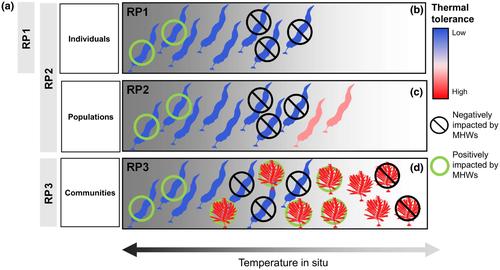当前位置:
X-MOL 学术
›
Glob. Change Biol.
›
论文详情
Our official English website, www.x-mol.net, welcomes your
feedback! (Note: you will need to create a separate account there.)
Impacts of marine heatwaves in coastal ecosystems depend on local environmental conditions
Global Change Biology ( IF 10.8 ) Pub Date : 2024-08-19 , DOI: 10.1111/gcb.17469 Samuel Starko 1 , Mirjam van der Mheen 1 , Albert Pessarrodona 1 , Georgina V Wood 1 , Karen Filbee-Dexter 1, 2 , Christopher J Neufeld 3 , Shinae Montie 1 , Melinda A Coleman 4 , Thomas Wernberg 1, 2
Global Change Biology ( IF 10.8 ) Pub Date : 2024-08-19 , DOI: 10.1111/gcb.17469 Samuel Starko 1 , Mirjam van der Mheen 1 , Albert Pessarrodona 1 , Georgina V Wood 1 , Karen Filbee-Dexter 1, 2 , Christopher J Neufeld 3 , Shinae Montie 1 , Melinda A Coleman 4 , Thomas Wernberg 1, 2
Affiliation

|
Marine heatwaves (MHWs), increasing in duration and intensity because of climate change, are now a major threat to marine life and can have lasting effects on the structure and function of ecosystems. However, the responses of marine taxa and ecosystems to MHWs can be highly variable, making predicting and interpreting biological outcomes a challenge. Here, we review how biological responses to MHWs, from individuals to ecosystems, are mediated by fine‐scale spatial variability in the coastal marine environment (hereafter, local gradients). Viewing observed responses through a lens of ecological theory, we present a simple framework of three ‘resilience processes’ (RPs) by which local gradients can influence the responses of marine taxa to MHWs. Local gradients (1) influence the amount of stress directly experienced by individuals, (2) facilitate local adaptation and acclimatization of individuals and populations, and (3) shape community composition which then influences responses to MHWs. We then synthesize known examples of fine‐scale gradients that have affected responses of benthic foundation species to MHWs, including kelp forests, coral reefs, and seagrass meadows and link these varying responses to the RPs. We present a series of case studies from various marine ecosystems to illustrate the differential impacts of MHWs mediated by gradients in both temperature and other co‐occurring drivers. In many cases, these gradients had large effect sizes with several examples of local gradients causing a 10‐fold difference in impacts or more (e.g., survival, coverage). This review highlights the need for high‐resolution environmental data to accurately predict and manage the consequences of MHWs in the context of ongoing climate change. While current tools may capture some of these gradients already, we advocate for enhanced monitoring and finer scale integration of local environmental heterogeneity into climate models. This will be essential for developing effective conservation strategies and mitigating future marine biodiversity loss.
中文翻译:

海洋热浪对沿海生态系统的影响取决于当地的环境条件
由于气候变化,海洋热浪(MHW)的持续时间和强度不断增加,现已成为海洋生物的主要威胁,并对生态系统的结构和功能产生持久影响。然而,海洋类群和生态系统对 MHW 的反应可能存在很大差异,这使得预测和解释生物学结果成为一项挑战。在这里,我们回顾了从个体到生态系统对 MHW 的生物反应是如何通过沿海海洋环境中的精细尺度空间变异(以下称为局部梯度)来介导的。通过生态理论的视角观察观察到的反应,我们提出了一个由三个“恢复过程”(RP)组成的简单框架,局部梯度可以通过该框架影响海洋类群对 MHW 的反应。局部梯度 (1) 影响个体直接经历的压力大小,(2) 促进个体和群体的局部适应和适应,(3) 塑造群落组成,从而影响对 MHW 的反应。然后,我们综合了已知的细尺度梯度示例,这些梯度影响了底栖基础物种对 MHW 的响应,包括海带森林、珊瑚礁和海草草甸,并将这些不同的响应与 RP 联系起来。我们提出了一系列来自不同海洋生态系统的案例研究,以说明由温度梯度和其他同时发生的驱动因素介导的 MHW 的不同影响。在许多情况下,这些梯度具有很大的效应量,有几个局部梯度的例子导致影响达到 10 倍或更多(例如,生存率、覆盖率)。本次审查强调了在持续气候变化的背景下需要高分辨率环境数据来准确预测和管理 MHW 的后果。 虽然当前的工具可能已经捕获了其中一些梯度,但我们主张加强监测并将当地环境异质性更精细地整合到气候模型中。这对于制定有效的保护战略和减轻未来海洋生物多样性的丧失至关重要。
更新日期:2024-08-19
中文翻译:

海洋热浪对沿海生态系统的影响取决于当地的环境条件
由于气候变化,海洋热浪(MHW)的持续时间和强度不断增加,现已成为海洋生物的主要威胁,并对生态系统的结构和功能产生持久影响。然而,海洋类群和生态系统对 MHW 的反应可能存在很大差异,这使得预测和解释生物学结果成为一项挑战。在这里,我们回顾了从个体到生态系统对 MHW 的生物反应是如何通过沿海海洋环境中的精细尺度空间变异(以下称为局部梯度)来介导的。通过生态理论的视角观察观察到的反应,我们提出了一个由三个“恢复过程”(RP)组成的简单框架,局部梯度可以通过该框架影响海洋类群对 MHW 的反应。局部梯度 (1) 影响个体直接经历的压力大小,(2) 促进个体和群体的局部适应和适应,(3) 塑造群落组成,从而影响对 MHW 的反应。然后,我们综合了已知的细尺度梯度示例,这些梯度影响了底栖基础物种对 MHW 的响应,包括海带森林、珊瑚礁和海草草甸,并将这些不同的响应与 RP 联系起来。我们提出了一系列来自不同海洋生态系统的案例研究,以说明由温度梯度和其他同时发生的驱动因素介导的 MHW 的不同影响。在许多情况下,这些梯度具有很大的效应量,有几个局部梯度的例子导致影响达到 10 倍或更多(例如,生存率、覆盖率)。本次审查强调了在持续气候变化的背景下需要高分辨率环境数据来准确预测和管理 MHW 的后果。 虽然当前的工具可能已经捕获了其中一些梯度,但我们主张加强监测并将当地环境异质性更精细地整合到气候模型中。这对于制定有效的保护战略和减轻未来海洋生物多样性的丧失至关重要。































 京公网安备 11010802027423号
京公网安备 11010802027423号